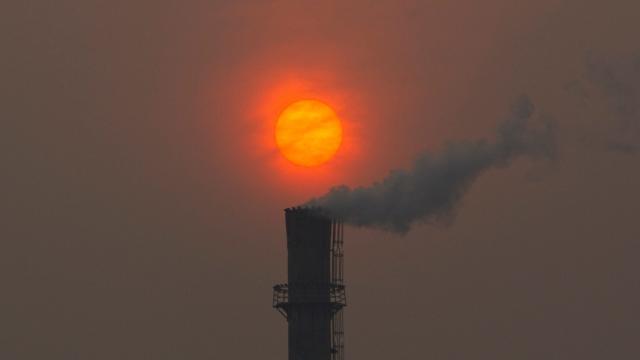Fresh off of global climate strikes on Friday and Saturday, a United Nations report published on Monday shows that the five-year period ending at the close of the year (2015-2019) is slated to be the hottest of any five-year period on record.
The paper, based on data compiled by the UN’s World Meteorological Organisation, found that humans have already warmed the planet to an average of 1.1 degrees Celsius above pre-industrial temperatures and that Antarctic ice sheet loss is speeding up. Per Agence France-Presse:
“It is currently estimated to be 1.1 deg C above pre-industrial (1850-1900) times and 0.2 deg C warmer than 2011-2015,” said the report titled United in Science, a synthesis of key findings.
Other major takeaways from the report include that the extent of Arctic summer sea ice has declined at a rate of 12 per cent per decade over the past 40 years, with the four lowest values between 2015 and 2019.
Overall, the amount of ice lost from the Antarctic ice sheet increased by a factor of six each year between 1979 and 2017, while glacier loss for 2015 to 2019 is also the highest for any five-year period on record.
While that’s bad enough on its own, the more ominous finding from the report is that humans are nowhere close to “peak emissions” — a hypothesised high-water point after which humans will begin pumping less carbon into the atmosphere. CO2 emissions rose two per cent in 2018 to 37 billion tonnes, according to AFP.
Additionally, the Financial Times reported that annual sea level rise has sped up to 5 mm per year, up from 3 mm per year during the 1997-2006 season, while the growth rate for CO2 concentration in the atmosphere was 20 per cent higher from 2015-2019 than the prior five year period. The ocean, which absorbs most of the excess heat retained by the planet due to climate change, had the highest heat content measurements in 2018 than during any other year on record.
The paper estimated that if business continues as usual with countries only meeting their Paris Agreement commitments, peak emissions won’t hit until after 2030 and there will be 2.9C – 3.4C degrees of warming by the year 2100.
The world would need to triple its reduction commitments to keep warming below 2 degrees Celsius, a level already considered unsafe. The UN also warned that increasing global average temperatures “increase the risks of crossing critical tipping points,” i.e. points of no return after which abrupt or irreversible change may occur.
“Climate change causes and impacts are increasing rather than slowing down,” WMO chief and UN climate science adviser Petteri Taalas told the Times. “As we have seen this year with tragic effect in the Bahamas and Mozambique, sea level rise and intense tropical storms led to humanitarian and economic catastrophes.”
“Sea-level rise has accelerated and we are concerned that an abrupt decline in the Antarctic and Greenland ice sheets, which will exacerbate future rise,” Taalas added.
“Climate change due to us is accelerating and on a very dangerous course,” Grantham Institute chair and University of Reading meteorology professor Brian Hoskins told the BBC. “We should listen to the loud cry coming from the schoolchildren. There is an emergency — one for action in both rapidly reducing our greenhouse gas emissions towards zero and adapting to the inevitable changes in climate.”
The UN is convening a one-day special summit on climate change on Tuesday at its New York headquarters, which UN secretary general António Guterres has described as an opportunity for world leaders “not to come with fancy speeches, but with concrete commitments,” per the Times. Guterres added that “People want solutions, commitments and action. I expect there will be an announcement and unveiling of a number of meaningful plans on dramatically reducing emissions during the next decade, and on reaching carbon neutrality by 2050.”
However, questions over continued reliance on the coal industry have led to Japanese Prime Minister Shinzo Abe and Australian Prime Minister Scott Morrison being barred from attendance, according to the Times. Saudi Arabia, Brazil, and the U.S. will also not be attending.
“This reads like a credit card statement after a 5-year long spending binge,” University of Edinburgh carbon management chair professor Dave Reay told AFP. “Our global carbon credit is maxed out. If emissions don’t start falling there will be hell to pay.”
